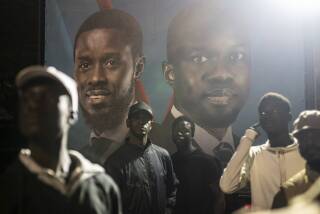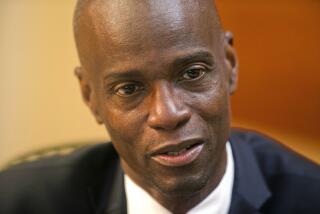Chadli Bendjedid dies at 83; former president of Algeria
Chadli Bendjedid, who served as the third president of Algeria before being overthrown in a bloodless military coup in 1992 as he was phasing in democratic reforms, died Saturday. He was 83.
Bendjedid died at a military hospital in Algiers, according to the state news agency. He had been admitted last week for kidney-related problems.
He emerged from the political shadows to take power in 1979 after the death of President Houari Boumedienne, a vociferous and radical Third World leader who gave refuge to hijackers and terrorists, and supported liberation movements on far-flung shores.
Under Bendjedid, Algeria’s tone became increasingly more moderate and conciliatory as he moved Algeria away from such hard-line Arab radicals as Syria, Libya and South Yemen.
An army colonel and devout Muslim, Bendjedid had more of the air of a business executive than a firebrand. He had an understated manner and was considered more of a listener than a talker. Boumedienne had been an ideologue; Bendjedid was a pragmatist.
At his presidential inauguration, he had promised little except continuity and affirmed that socialism was “an irreversible option for our country.” Under the slogan “For a Better Life,” Bendjedid turned Algeria away from the Soviet-style economic system that had characterized its independence, gained from France in 1962 after 132 years of colonial rule.
He gave the country a multiparty political system, presiding over a series of political reforms that allowed for competitive legislation and municipal elections. But the reforms failed to satisfy an increasingly assertive fundamentalist Islamist movement.
When an Islamist party swept the first round of parliamentary elections, Algeria’s powerful generals stepped in, ousted Bendjedid and canceled the elections in 1992. The coup prompted an armed resistance that turned into a decade-long civil war, which tore the country apart and claimed at least 200,000 lives.
Bendjedid was kept under house arrest hundreds of miles from the capital until 1999, when he was freed.
As president, he had endorsed what he called the “nonexploitive private sector” and introduced increased incentives for farmers. He dismantled some monolithic state-owned companies and broadened links to the West. Slowly, the Marxist overlay on the oil-based economy gave way to a combination of socialism and capitalism.
Bendjedid’s government played a major negotiating role in winning the freedom of the 52 American hostages in Iran in 1981. Four years later, he became the first Algerian president to make an official visit to the U.S.
The son of a landlord, he was born in 1929 in Sebaa, a town in eastern Algeria. He began his military career after the 1954 outbreak of the eight-year revolution against France, which eventually cost the lives of an estimated 300,000 Algerians and 21,000 Frenchmen.
By 1960, Bendjedid was a battalion commander in the National Liberation Front and, in 1961, a member of the general staff in Boumedienne’s army on the Tunisian border.
In his post-independence role as commander of the Western Military Region — a position he held from 1954 to 1978 — Bendjedid helped swing western Algeria to Boumedienne in the 1965 coup that ousted Algeria’s first president, Ahmed Ben Bella. Bendjedid was rewarded with a seat on the Revolutionary Council and was serving as minister of defense when he became president.
Information on survivors was not available.
Lamb is a former Times staff writer.
The Associated Press contributed to this report.
More to Read
Start your day right
Sign up for Essential California for the L.A. Times biggest news, features and recommendations in your inbox six days a week.
You may occasionally receive promotional content from the Los Angeles Times.






